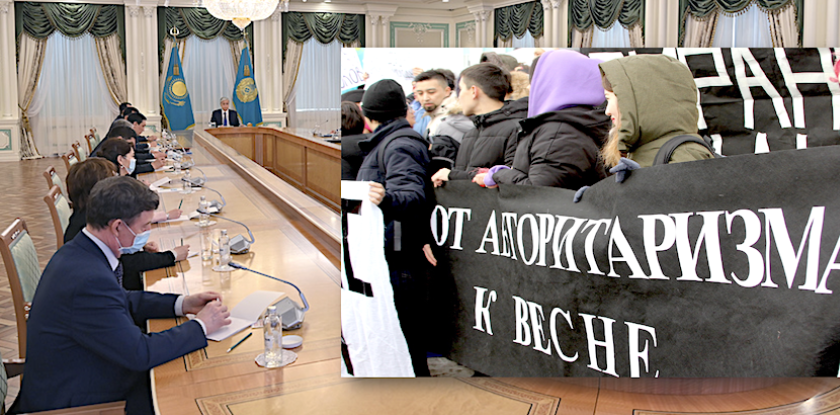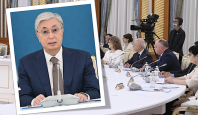The Kazakh political spectacle called “A Frenzied Imitation of Democratic Reforms” continues. On May 5, 2022, President Kassym-Jomart Tokayev signed the decree on holding the nationwide referendum on adopting the Akorda-initiated constitutional amendments on June 5, 2022.
Moreover, in order to persuade the Kazakhs to take part in the referendum and cast the “yes” vote, the head of the state has made a personal appeal to his fellow citizens.
Since we have already commented on this project in our publication”What’s Behind Tokayev’s Words on Referendum”, we are not going to go back to this topic. Especially since many in the country have already grasped the gist and the purpose of Tokayev’s “perestroika”.
To the rest, we recommend reading the interview of Kazakh political expert Dimash Alzhanov that Radio Azattyk has very aptly titled “The Regime Is Being Customized to the Needs of the Second President”.
But something else interests us in this matter – what can the political opponents of Akorda and Tokayev counterpose to this new political show inside the country and abroad?
We at KZ.expert believe that the opposition has now found itself in an extremely difficult position. It is going to be very hard to openly challenge the current constitutional amendments that are truly changing the country’s political system (to what extent and to whose benefit is another matter) and taking out any mention of First President Nursultan Nazarbayev’s name from the Constitution.
Frankly, it would be a stupid thing to do: such actions won’t have much effect. Most voters will participate in the nationwide referendum as per usual and vote in the way they are told.
As for those opposing the authoritarian political system and the “super-presidential” vertical, many of them will vote for adopting the amendments due to the simple reason that semi-changes are better than no change at all.
For this reason, we have absolutely no doubt that the overwhelming majority of adult citizens making it to the ballot stations on June 5, 2022, are gong to vote for adopting the changes and amendments to the Kazakh Constitution. What is it going to be in the numeric terms? Probably more than 99%.
But what interests us here is what the ratio of those actually voting to the total number of the registered voters is going to be? 60 percent or 80 percent?
If the number of the people casting their vote on June 5, 2022, will be closer to 60%, it will, in our opinion, signify the failure of Kassym-Jomart Tokayev and Akorda.
For it will mean that even the opportunity to change the Constitution and make the country more democratic at least on paper and to take the mention of Nursultan Nazarbayev’s name out of the country’s principal law, has failed to persuade them to be more proactive.
However, if, on June 5, 2022, the share of the actual voters will get closer to 80% of their listed number, this will undoubtedly signify the victory for the second President and his team.
On the other hand, this victory may soon turn into a problem for the winners. The thing is that, in time, the Kazakhs supporting Kassym-Jomart Tokayev will start demanding a payment for their credence. In other words, increasing the level and the quality of their life which the current authorities cannot provide ipso facto.
Going back to the issue of what the political opponents of Akorda and Kassym-Jomart Tokayev can counterpose to their agenda (whether inside the country or abroad, leftists or rightists, ideology-driven or greed-motivated), we would like to point out that they have quite wide a range of possibilities in front of them.
However, for them to achieve the maximal result, it is imperative that they stop fighting with each other. And start using the opportunities that the first post-January election campaign is providing. For, Kassym-Jomart Tokayev and Akorda have got enough Achilles’ heels. The most sensitive of them being -
- the January tragedy including the Presidential order to shoot without a warning and the systemic despotism of the siloviks;
- the refusal on the part of the authorities to investigate the embezzlement of the state funds and the instances of abuse of authority on the part of Nursultan Nazarbayev and his closest relatives and allies;
- the desire of Kassym-Jomart Tokayev to preserve the authoritarian political system and not to allow for the destruction of the “super-presidential” vertical so that he can adapt them to the needs of the new “leader of the nation” and the new situation;
- Akorda assuming the “ostrich” position regarding Russia’s military invasion of Ukraine and the clash of the former with the entire collective West;
- the unavoidable decline of the level and the quality of life of the Kazakhs as a result of the abnormal growth of the prices and tariffs;
- Akorda’s obstinate refusal to legalize the relatively radical political groups on which Akorda cannot exert any influence;
- the involvement of all (with no exception) the key governmental officials in Nursultan Nazarbayev’s crimes and failures.
On the other hand, the people opposing Kassym-Jomart Tokayev and Akorda should not place all their focus on the referendum since it is already clear that, once the constitutional amendments will have been made, the President will dissolve the Mazhilis to bring it in line with the new principal law.
We at KZ.expert believe that the early parliamentary elections are likely to take place as soon as the next year, in September or October perhaps.
So, new possibilities are now opening before the Kazakh opposition. On the back of the two election campaigns, Akorda will have a much harder time isolating, ignoring and silencing those with an opinion different from the view of the power holders.
The question to which we have no answer is this – will the opposition be able to use Akorda and Kassym-Jomart Tokayev’s political extravaganza to their own advantage? Or will it, yet again, get sucked in figuring out who is more sincere and honest in their appeals to the fellow citizens and whom the latter should trust more?





